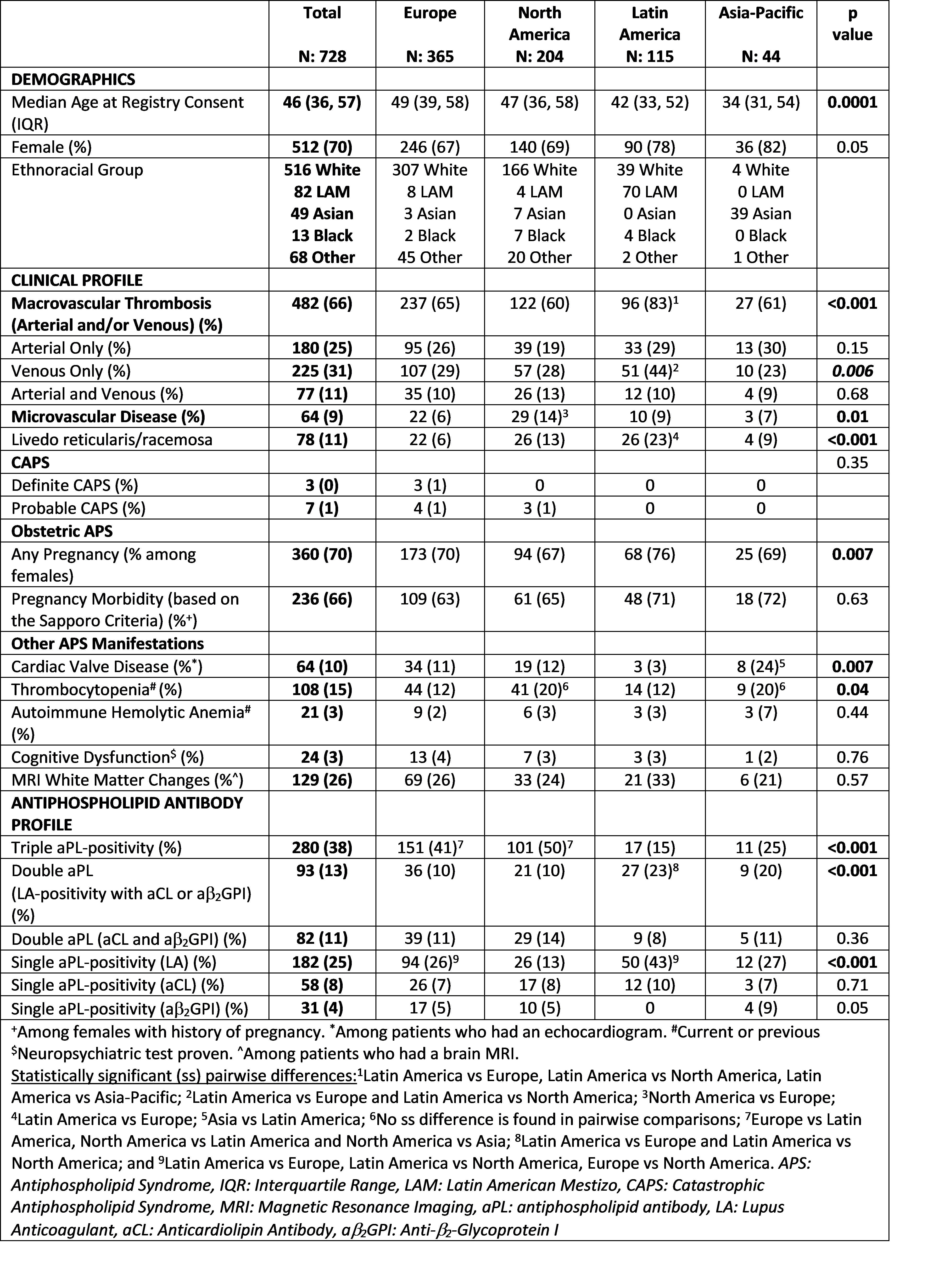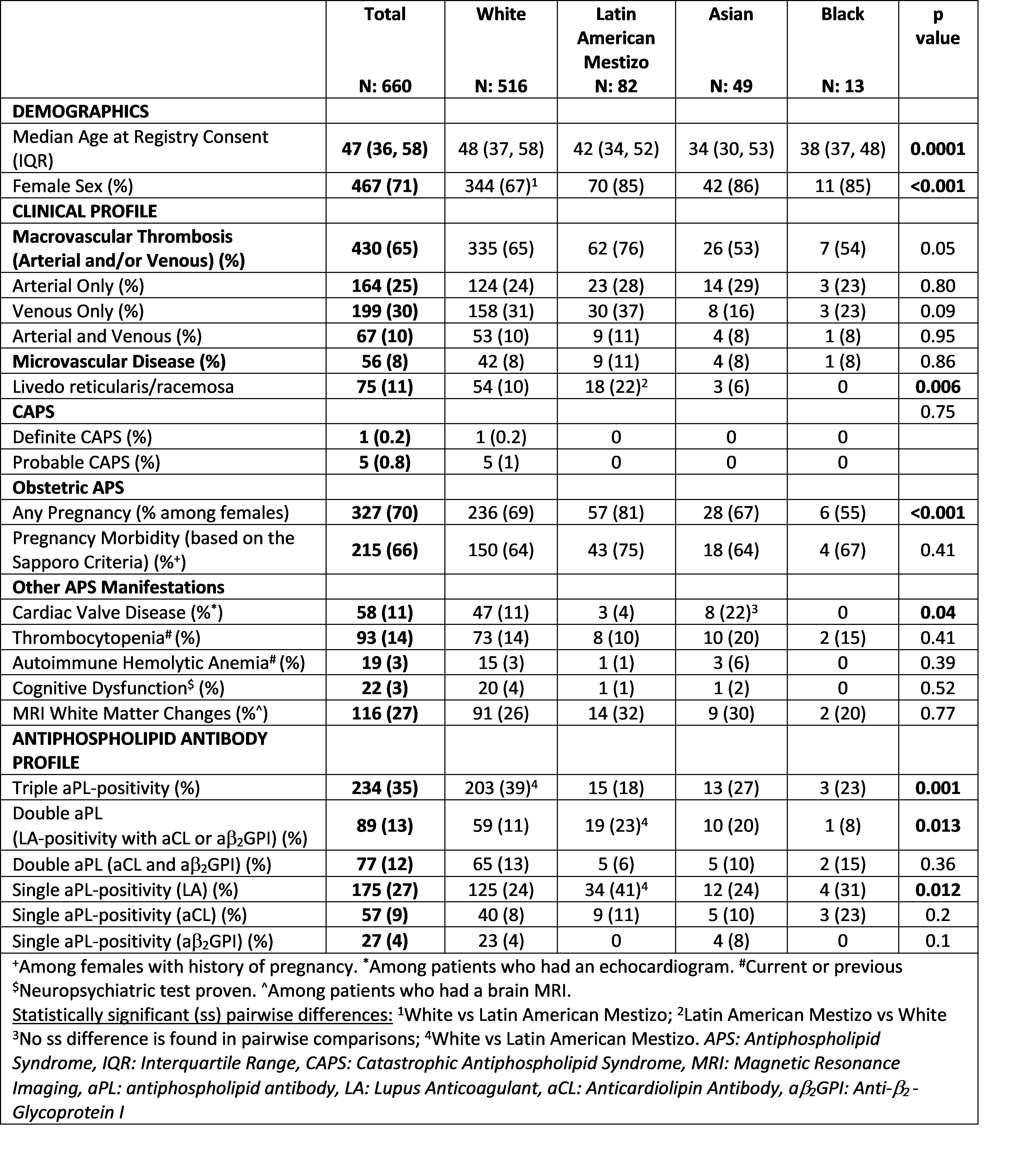Session Information
Session Type: Poster Session A
Session Time: 10:30AM-12:30PM
Background/Purpose: The APS ACTION Registry was created to study long-term outcomes in persistently antiphospholipid antibody (aPL)-positive patients with and without other systemic autoimmune rheumatic diseases (SARDs). Our goal was to examine the regional and ethnoracial differences in clinical phenotypes and aPL profiles among aPL-positive patients with no other SARDs.
Methods: A web-based data capture system is used to store patient demographics and aPL-related medical history. Inclusion criteria are positive aPL, based on the Revised Sapporo APS classification criteria, tested at least twice within one year prior to enrollment. Patients are followed every 12±3 months with clinical data and blood collection. For this cross-sectional analysis of the baseline data, demographic, clinical, and laboratory characteristics of registry patients were analysed based on different regions (Europe [EU], North America [NA], Latin America [LA], and Asia-Pacific [AP]) and self-reported ethnorace (White, Latin American Mestizo [LAM], Asian, and Black) using chi square, Fisher’s exact, and Kruskal-Wallis tests.
Results: As of December 2023, 61% (728/1,204) of the registry patients had no history of other SAID, while 78% (568/728) fulfilled the Revised Sapporo APS classification criteria (365 [50%] from EU, 204 [28%] NA, 115 [16%] LA, and 44 [6%] AP) (516 [78%] White, 82 [12%] LAM, 49 [7%] Asian, and 13 [2%] Black). Based on regional comparisons: a) overall macrovascular thrombosis and venous thrombosis, microvascular disease, and cardiac valve disease were more frequent in patients from LA, NA, and AP, respectively; b) thrombocytopenia in NA and AP; c) livedo reticularis/racemosa in LA; and d) triple aPL-positivity in NA and EU with isolated lupus anticoagulant positivity in LA (Table 1). Based on ethnoracial comparisons: a) there were less females among White patients; b) cardiac valve disease was more frequent in Asians, and livedo reticularis/racemosa in LAM; and c) triple aPL positivity was more frequent in Whites, while isolated lupus anticoagulant positivity in LAM patients (Table 2).
Conclusion: In the APS ACTION international registry of patients with persistently aPL-positive patients with or without APS classification, Blacks were the least frequently (2%) represented ethnoracial group. This finding aligns with other studies suggesting that APS is relatively rare in Black individuals. However, it is important to acknowledge the potential for inherent selection biases and disparities in healthcare access that may influence these results. Our analysis highlights the need for further investigation into the genetic and social determinants impacting the clinical and serologic phenotype of aPL-positive patients across diverse populations.
To cite this abstract in AMA style:
Gkrouzman E, Clarke A, Tektonidou M, Pengo V, Sciascia S, Pardos-Gea J, Kello N, Paredes-Ruiz D, Aguirre-Zamorano M, Belmont H, Fortin P, Ramires de Jesús G, Atsumi T, Zhang Z, Efthymiou M, Branch D, Pazzola G, Andreoli L, Duarte-Garcia A, Rodriguez-Almaraz E, Petri M, Cervera R, Artim Esen B, Pons-Estel G, Shi H, Knight J, Willis R, Meroni P, Bertolaccini M, Cohen H, Roubey R, Andrade D, Erkan D. Regional and Ethnoracial Differences Among Antiphospholipid Antibody-Positive Patients with No Other Systemic Autoimmune Rheumatic Diseases: Results from AntiPhospholipid Syndrome Alliance for Clinical Trials and InternatiOnal Networking (APS ACTION) Registry [abstract]. Arthritis Rheumatol. 2024; 76 (suppl 9). https://acrabstracts.org/abstract/regional-and-ethnoracial-differences-among-antiphospholipid-antibody-positive-patients-with-no-other-systemic-autoimmune-rheumatic-diseases-results-from-antiphospholipid-syndrome-alliance-for-clinica/. Accessed .« Back to ACR Convergence 2024
ACR Meeting Abstracts - https://acrabstracts.org/abstract/regional-and-ethnoracial-differences-among-antiphospholipid-antibody-positive-patients-with-no-other-systemic-autoimmune-rheumatic-diseases-results-from-antiphospholipid-syndrome-alliance-for-clinica/


